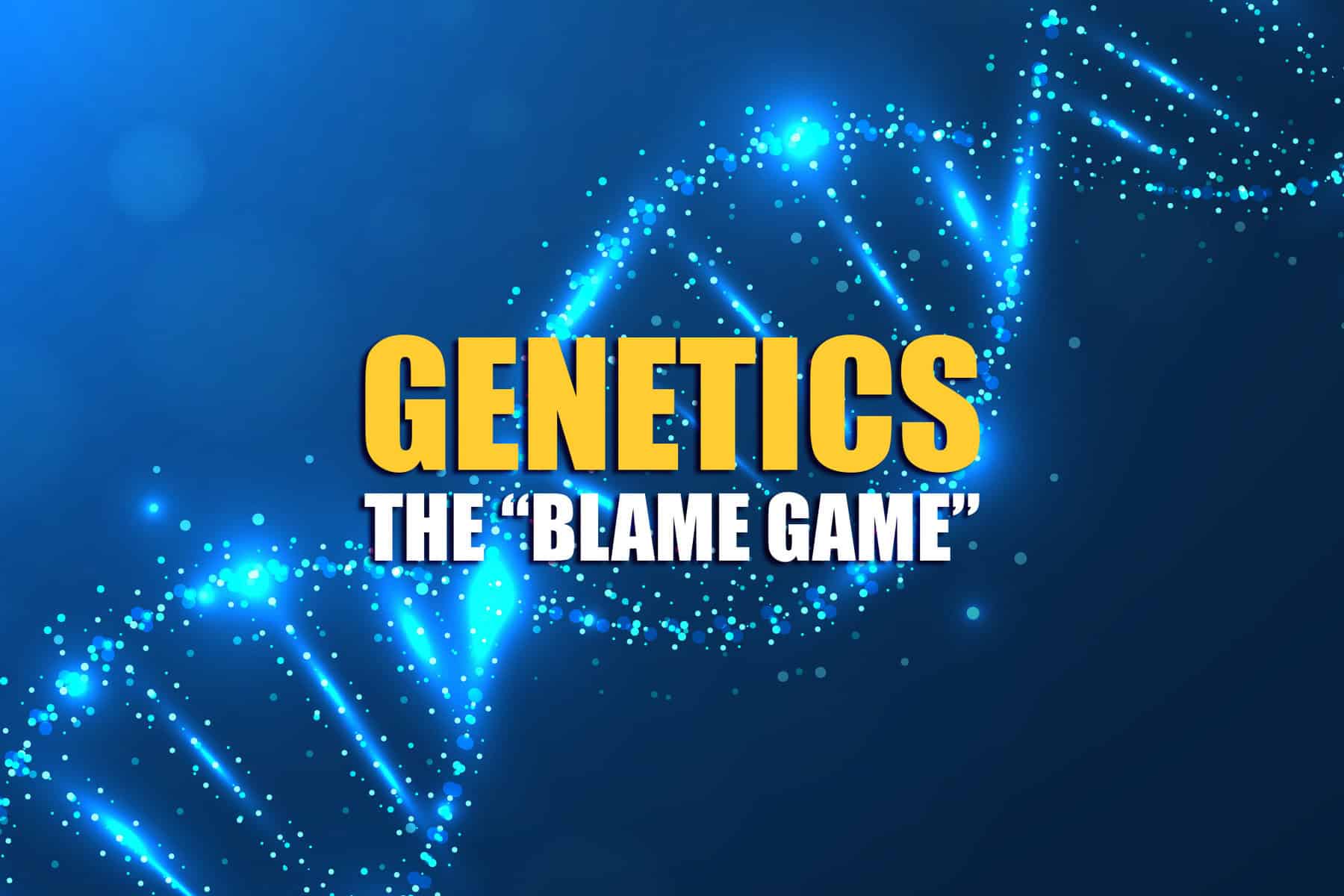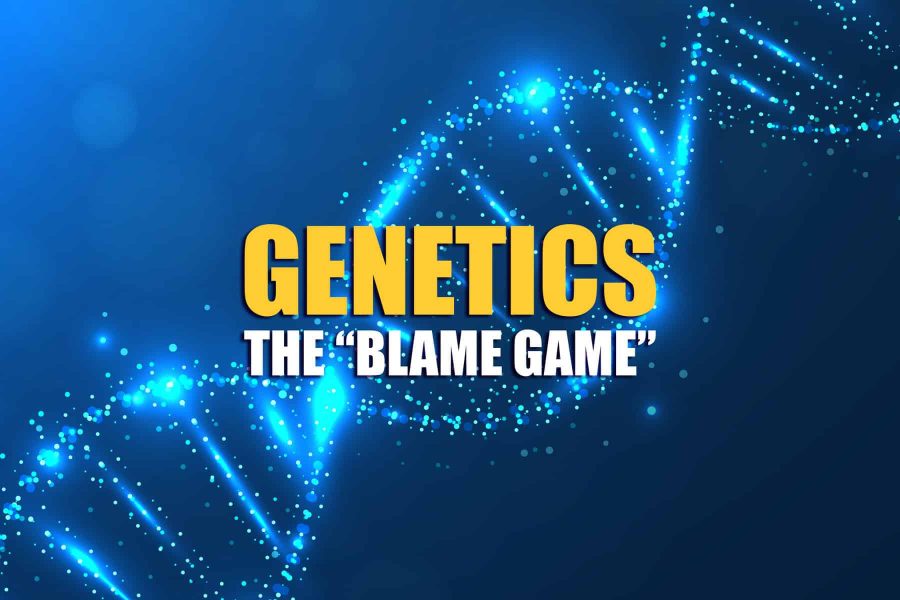The “Blame Game” of Genetics

How often have we heard it? “It’s just in my genes,” or, “My family’s always been like this.” Ah, genetics: the magical scapegoat that swoops in to explain every health woe without so much as a second thought. But let’s put it bluntly — how much of this is really about genes, and how much is a convenient excuse for unhealthy habits?
Here at Fitness Union Activewear (FU!), we’ve had it with the blame game. We’re here to talk about what science really says about genetics, health, and those pesky habits that we all know are part of the problem. Spoiler: It turns out, you have more control over your health than you might think.
1. The Genetics Excuse: Just How Strong Is It, Really?
Yes, genes are real. They give you your eye color, determine if you’re tall or short, and can affect things like metabolism to a degree. But let’s clarify something: genetics might set the stage, but your lifestyle choices are the main act.
Let’s take obesity, for example. Studies show that less than 5% of obesity cases are purely genetic. Yep, only 5%! The rest is influenced by factors within your control, like diet, exercise, and overall lifestyle. So if you’re reaching for that “it’s genetic” excuse, make sure it holds up, because there’s a 95% chance it doesn’t.
2. Choices: The Real Health Game-Changer
While it’s easier to chalk things up to “bad genes,” it’s often our own choices that tip the scales. Here’s where lifestyle habits come into play:
Diet: What you eat matters far more than you might think. Ultra-processed foods, sugary snacks, and endless fast-food orders don’t “run in the family” — they’re daily choices that add up. Want to blame your DNA for that fast-food addiction? Try blaming the drive-thru routine instead.
Exercise: No one’s DNA forces them to sit on the couch, binge-watching Netflix all day. Sure, some people might have a slower metabolism or less muscle mass, but movement is always within your control. A consistent exercise routine not only builds physical strength but also changes how your body burns calories, regardless of genetics.
Sleep: Believe it or not, sleep is as important as food and exercise. Chronic sleep deprivation alters hormone levels and increases stress, leading to weight gain, low energy, and other health issues. Genes don’t control your bedtime — that’s on you.
3. Environment and Habits: The Silent Powerhouses
Genetics aren’t nearly as bossy as some of our everyday habits. Picture this: if your family has a habit of sitting down every evening with a family-sized bag of chips, that habit has more to do with your health than your shared DNA. And research backs this up.
The concept of epigenetics shows us that our environment and lifestyle choices can “turn on” or “turn off” certain genes. So yes, while your genetic blueprint might include some health risks, your lifestyle choices are what actually determine if those genes get expressed.
So maybe the next time you’re considering that tub of ice cream, think about whether it’s really “fate” or just habit.
4. Fitness Union Activewear (FU!): Your No-Excuses Fitness Partner
At Fitness Union Activewear (FU!), we believe in giving you every tool and style to make working out both enjoyable and effective. Our gear is designed for real people who are here to make real changes — no excuses. We’re all about promoting habits that turn into results.
So slip into something that won’t quit on you halfway through your workout. And while you’re at it, remember that your DNA isn’t going to the gym for you — that’s up to you.
So slip into something that won’t quit on you halfway through your workout. And while you’re at it, remember that your DNA isn’t going to the gym for you — that’s up to you.
5. DNA vs. Daily Decisions: Who Wins?
Here’s the final answer: daily decisions win. Period. Let’s look at some powerful lifestyle changes that can have lasting health impacts:
Reducing Sugar Intake: Excessive sugar has been linked to countless health problems, from obesity to diabetes and heart disease. And no, you can’t blame this one on your grandparents.
Consistent Exercise: Whether it’s running, weightlifting, or a simple daily walk, movement transforms your metabolism, builds muscle, and strengthens your heart.
Stress Management: Chronic stress messes with everything from hormone balance to immune function. Genes can influence how we react to stress, but meditation, exercise, and sleep are proven stress relievers.
Making even a few of these adjustments could outweigh the genetic cards you’ve been dealt. And unlike our genes, these are things we can change.
6. But What About “Genetically Slow Metabolism”?
Slow metabolism is real, but here’s the twist: for most people, it’s minor. Lifestyle habits like regular exercise and a balanced diet play a far bigger role in burning calories than the slight variations in metabolic rates most people inherit.
If you’re still convinced your metabolism is a huge hurdle, here’s a reality check. Research shows that weightlifting, HIIT workouts, and even just walking every day can help anyone improve their metabolism. And yes, even you, with that “slow metabolism,” can make gains here.
7. The Harsh Truth About Comfort Zones
People often get into health ruts and blame their genetics because, let’s face it, habits are hard to break. It’s much easier to say, “I can’t help it, it’s in my genes,” than it is to face the reality that change is uncomfortable. But growth doesn’t happen in the comfort zone.
So if you’re reading this and realizing you’ve been using your DNA as a free pass to skip the gym or ignore nutrition, remember: every small choice adds up. When you step out of that comfort zone, it’s amazing how fast those “genetic limitations” start to shrink.
Here’s the bottom line: genetics might be a factor, but it’s hardly the whole picture. Blaming your DNA for health struggles is like blaming your car for taking you down the wrong road. It’s a convenient excuse, but it won’t get you where you want to go.
At Fitness Union Activewear, we believe in being realistic and responsible. So let’s ditch the blame game. Your choices have power — far more than the genes you were born with. That power is in your hands, and it’s time to own it.



